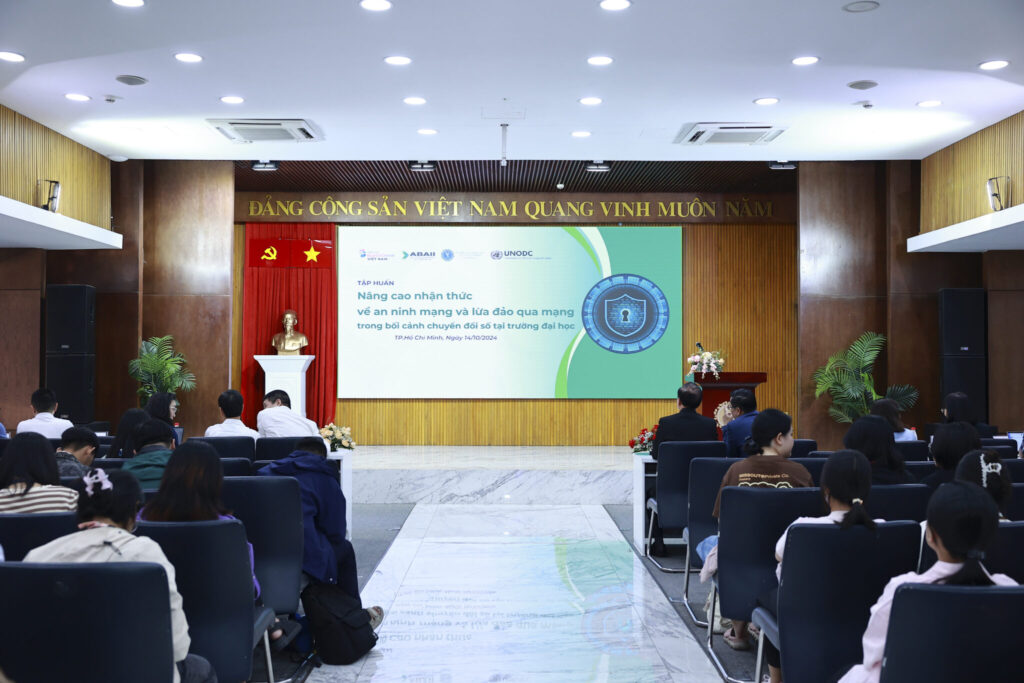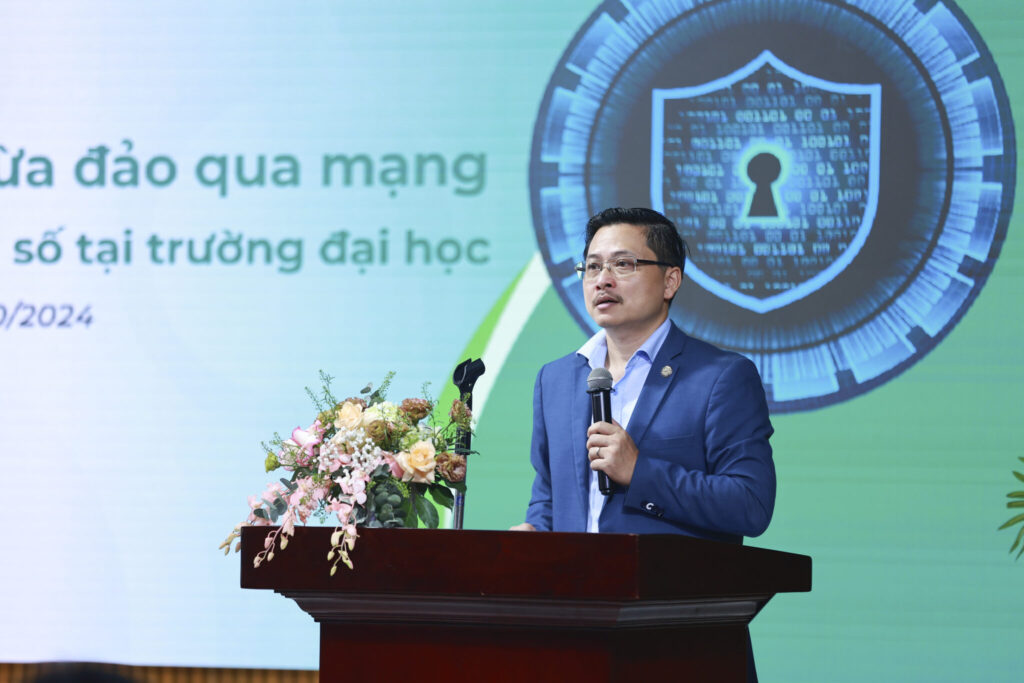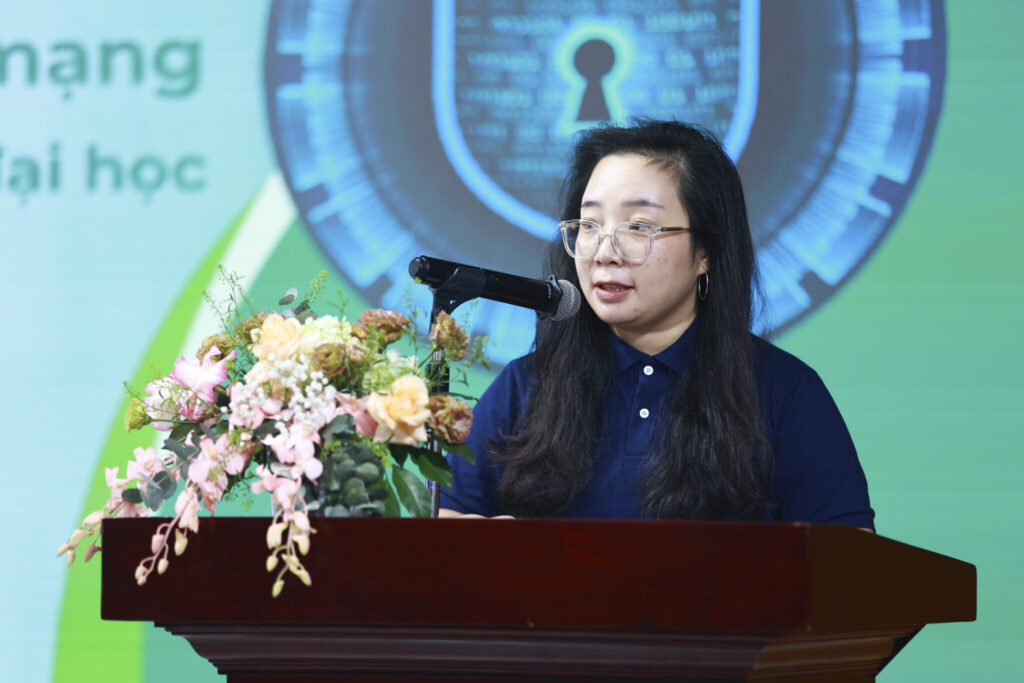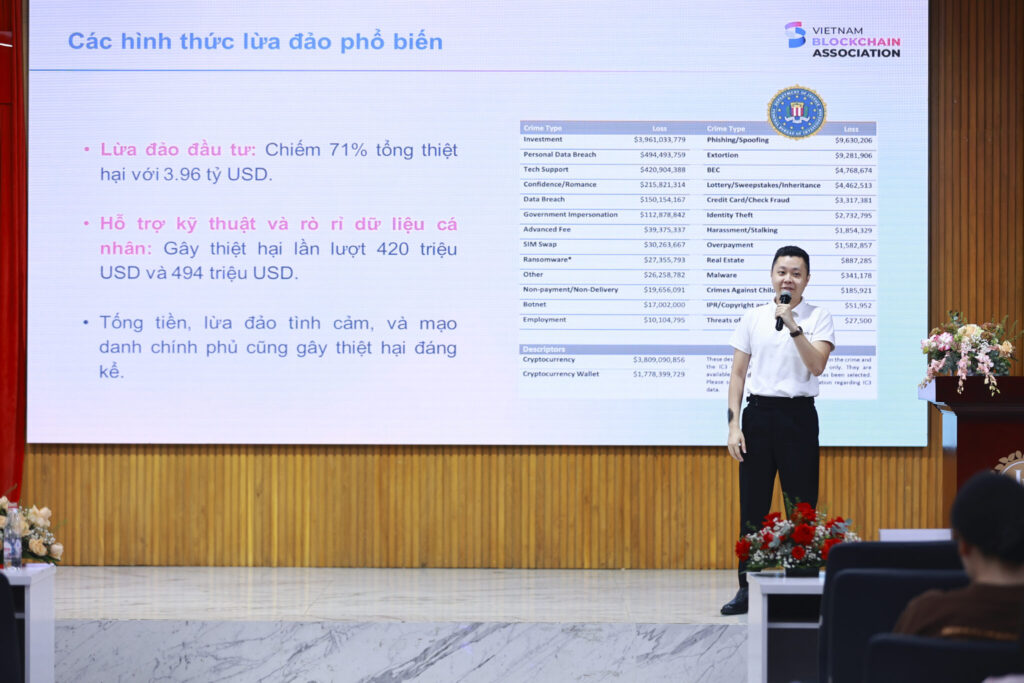The collaboration between the ABAII Academy and the United Nations Office on Drugs and Crime (UNODC) is not only focused on students at Ho Chi Minh City University of Law but also aims to provide knowledge and skills to combat online fraud for a wide range of students across the country as part of the ABAII Unitour, which seeks to promote Blockchain and AI.
On October 14, 2024, the Academy of Blockchain and AI Innovation (ABAII), the Vietnam Blockchain Association (VBA), and UNODC jointly organized a training program titled “Enhancing Cybersecurity Awareness and Anti-Fraud Skills in the Digital Transformation Era” at Ho Chi Minh City University of Law for over 300 students. This event was the 12th activity in the ABAII Unitour program, organized by the ABAII Academy and VBA across 30 universities nationwide, aiming to disseminate knowledge about Blockchain and AI and provide students with new career opportunities.

In his opening remarks, Associate Professor Dr. Trần Việt Dũng, Vice Rector of Ho Chi Minh City University of Law, stated that the university not only focuses on equipping students with specialized knowledge but also places great emphasis on enhancing their awareness and skills in protecting personal information and preventing online fraud, helping students confidently integrate into the rapidly evolving digital transformation landscape.
Regarding the current state of online fraud, Ms. Nguyễn Thị Như Trang, an officer of the National Cybercrime Program at UNODC Vietnam, mentioned that cybercrime is increasing at an alarming rate and tends to exploit advanced technology, making it difficult for the general public, especially students, to recognize fraudulent situations. Ms. Trang cited 24 common forms of online fraud published by the Information Security Department of the Ministry of Information and Communications, which span across almost all sectors and demographics, from simple scams like online lottery wins and impersonating tax officials or police officers to more complex schemes like deepfakes (high-quality videos that mimic faces and voices). She also shared scenarios that students often encounter to raise awareness about fraud risks and how to protect themselves in the current context.

According to Mr. Trần Huyền Dinh, Chairman of the Fintech Application Committee of the Vietnam Blockchain Association, with global liquidity, crypto assets are becoming a significant target for online fraudsters. In 2023 alone, the Federal Bureau of Investigation (FBI) recorded over 69,000 complaints related to crypto asset fraud, resulting in losses of up to $5.6 billion, a 45% increase compared to the previous year. Investment scams accounted for 71% of total losses, amounting to $3.96 billion. Other forms of fraud, such as technical support scams, personal data breaches, extortion, romance scams, and government impersonation, also caused significant damage.

Mr. Trần Dinh also noted that deepfake technology is becoming a powerful tool for high-tech criminals, allowing them to convincingly impersonate identities, making it easier for victims to fall for scams and leading to serious financial losses.
Regarding solutions, Mr. Trần Dinh stated that the first step victims need to take is to remain calm and refrain from making impulsive decisions to invest more money out of regret, hoping to recover their initial losses. Additionally, victims should report to the authorities and may submit reports to ChainTracer—a program for tracing and analyzing crypto transactions that exhibit signs of fraud, developed and implemented by the Vietnam Blockchain Association to alert and assist scam victims.

Since its launch in 2022, ChainTracer has assisted in recovering over $2 million from scams in Vietnam, providing more than 50 reports to victims and authorities to support investigative efforts. Mr. Dinh emphasized, “ChainTracer helps detect fraudulent activities early and enhances transparency in transactions, contributing to user protection and building a safer blockchain ecosystem.”
Experts and speakers in the program’s framework shared various issues related to legal regulations and important considerations in combating online fraud. Among them, Dr. Trần Thanh Thảo and Master’s Candidate Lê Trần Quốc Công from Ho Chi Minh City University of Law analyzed international and Vietnamese legal regulations concerning cybercrime, particularly those related to crypto asset fraud. Ms. Vũ Thu Hồng, program officer for Women, Peace and Security at UN Women Vietnam, presented challenges such as online harassment and threats women and children faced in the digital space. UN Women also called for specific measures to protect women and children while raising awareness about the potential risks in the digital environment.

Since its launch in 2022, Chaintracer has assisted in recovering over $2 million from scams in Vietnam, providing more than 50 reports to victims and authorities to support investigations. Mr. Dinh emphasized, “Chaintracer not only helps detect fraudulent activities early but also enhances transaction transparency, contributing to protecting users and building a safer blockchain ecosystem.”
Within the framework of the program, experts and speakers shared insights on relevant legal regulations and precautions to prevent online fraud. Dr. Tran Thanh Thao and MSc. Le Tran Quoc Cong from Ho Chi Minh City University of Law analyzed international and Vietnamese laws related to cybercrime, particularly digital asset fraud. Ms. Vu Thu Hong, Program Officer for Women, Peace, and Security at UN Women Vietnam, discussed the challenges of online harassment and threats faced by women and children in the digital space. UN Women also called for specific measures to protect women and children and raise awareness of potential risks in the digital environment.
